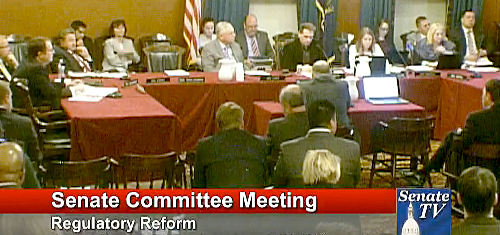 Wednesday saw Michigan politicians hold their first hearing into legislation that would authorize online casino and poker operations by the state’s licensed casino operators.
Wednesday saw Michigan politicians hold their first hearing into legislation that would authorize online casino and poker operations by the state’s licensed casino operators.
The hearing by the Senate’s Regulatory Reform Committee hearing was notable primarily for the lack of active participation by the five committee members in attendance, who were either remarkably disinterested or sufficiently impressed by the quality of the testimony to render their questions moot.
Sen. Mike Kowall, who introduced SB 889, aka the Lawful Internet Gaming Act, last month, started the proceedings by emphasizing the new ‘consumer protection’ mantra that pro-online camps have taken to espousing at these gatherings.
Kowall raised some eyebrows by stating that allowing internet gambling could create up to 22k new jobs, although he cited no sources for the number and clarified that this claim was “new to me as of yesterday.”
Next up was Poker Players Alliance exec John Pappas, whose testimony – including the obligatory Lock Poker reference – largely echoed his appearance at California’s latest online poker hearing last week, with a localized version of his real-time demo showing how many online gambling options are currently available to Michigan residents.
Then came a trio of representatives from Canada’s Amaya Gaming, the parent company of PokerStars. Jeanne David explained the efforts Amaya took to ensure its players had adequate responsible gaming protections, while operations director Steven Winter detailed ‘know your customer’ procedures and compliance director Matthew Robins talked up Amaya’s commitment to anti-money laundering.
The Amaya presentations were dry but detailed, yet the sole question directed at any one of the three reps was from Sen. Joe Hume, who wanted to know if customers from prohibited jurisdictions would be able to access Michigan sites, clearly having dozed off while the reps explained their geolocation successes.
Next up was Michigan Gaming Control Board deputy director David Murley, who reported that Gov. Rick Snyder had yet to take an official position on SB 889. But Murley answered “yes” to his own rhetorical question of whether the state was capable of regulating online gambling, as “we largely do it now and we do it well,” referencing Michigan’s successful online lottery.
Murley did express concern over SB 889’s plan to allow out-of-state customers in jurisdictions where online gambling is permitted to access Michigan-licensed sites. Murley said this “raises significant legal and policy questions” and would “need to be carefully considered.” Murley also suggested SB 889 might violate the state constitution, which requires voters to approve gaming expansion.
SB 889 would also require the state’s tribal gaming operators to waive their sovereign immunity, a point Murley wasn’t sure the tribes would find acceptable. Another potential “side effect” could come from tribes claiming that online legalization violated their gaming compacts, prompting them to withhold required payments to the state.
Spectrum Gaming analyst Michael Pollock was the day’s final witness, and the only one whose testimony sparked any real questions from legislators. Pollock said SB 889’s arbitrary limit of eight online licenses – meaning the majority of the state’s tribal and commercial casino operators would be left out – could force regulators to make some tough choices.
As other senators seized on this point, Kowall volunteered that he’d selected eight licenses merely as a “good place to start,” while suggesting that the arbitrary cap would require operators to demonstrate how their online plan would advance public policy.
No casino operators spoke at Wednesday’s hearing, although Detroit’s three commercial casino operators – whose taxes constitute 16% of the city’s total revenue – passed along messages saying they were all officially neutral on SB 889.
No vote was taken on Wednesday and the state legislature will officially adjourn on June 16, meaning there simply isn’t a lot of time to push SB 889 over the hump.
